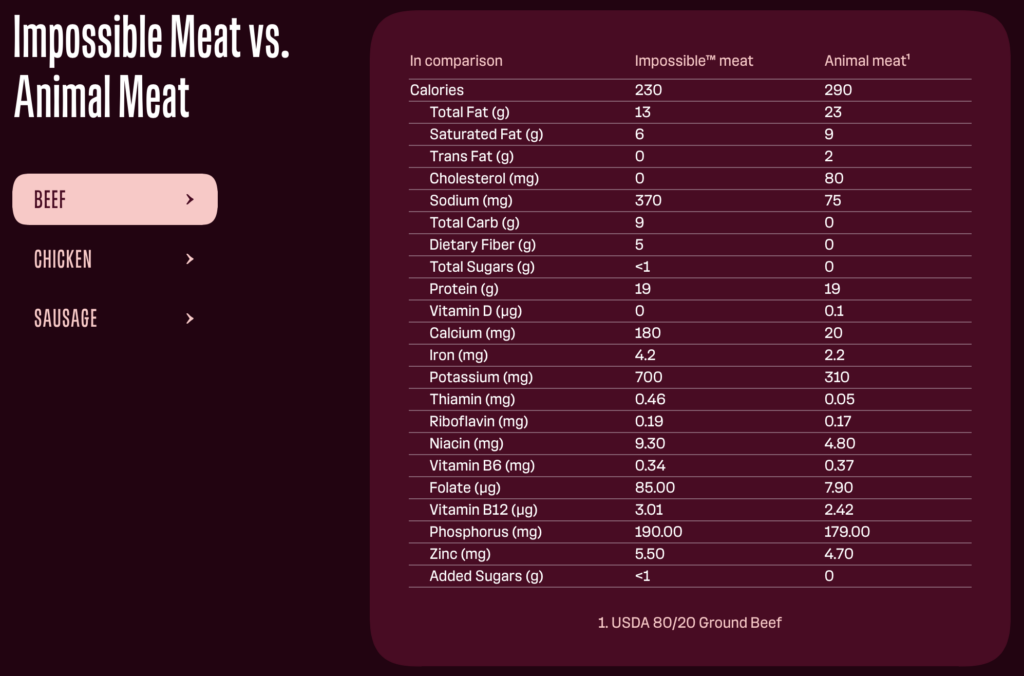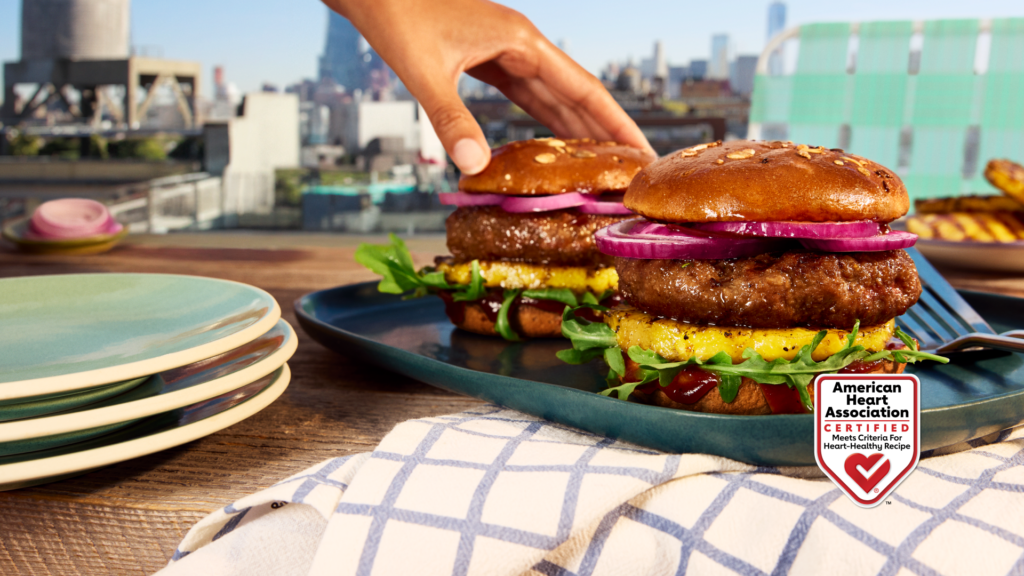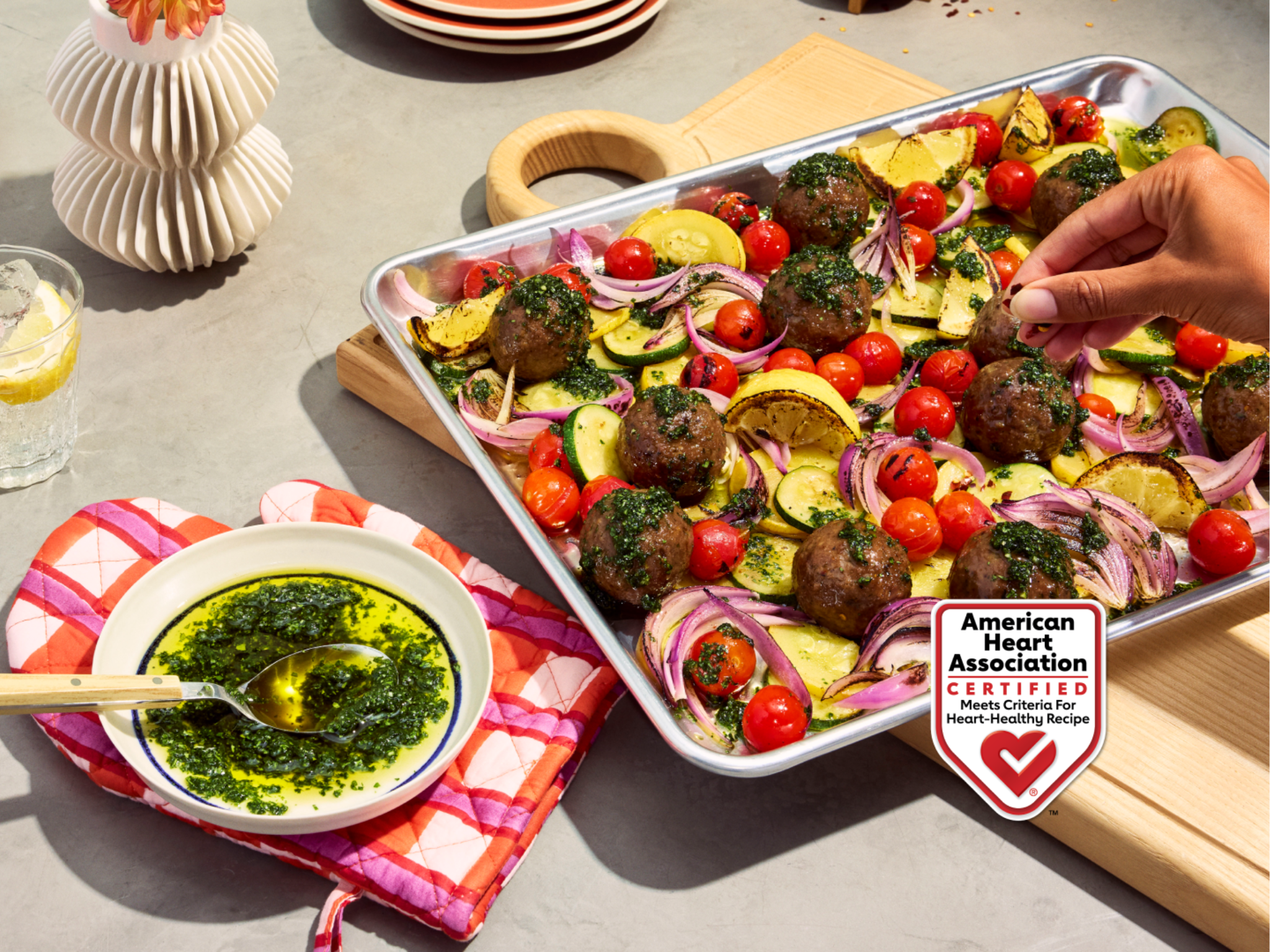Impossible Foods Hits Back At Plant-Based Meat Misinformation with Online ‘Health Hub’
7 Mins Read
Plant-based meat pioneer Impossible Foods has launched a Health Hub to battle misinformation about the industry, and has attained a new health certification for its Lite Beef.
In recent months, Peter McGuinness has been very vocal about one thing: the climate argument for plant-based food just doesn’t fly with consumers right now.
The Impossible Foods CEO said that to Reuters, to Bloomberg, and to Fast Company. These comments came amid a backdrop of faltering sales for meat analogues – dollar sales were down by 12% in 2023 – the closure of several brands in the space, and heightened misinformation by meat lobby groups.
These events led fellow Californian company Beyond Meat, one of Impossible Foods’s chief rivals, to lean all into health – it revamped its products and recipes to be more nutritionally sound, shook up the packaging to put health attributes front and centre, and backed it with a marketing campaign and cookbook. It now poses itself as a “health company”.
Impossible Foods, for its own part, refreshed its brand identity and product packaging earlier this year too, bringing taste and health descriptors to the fore. These efforts underscore the shifting needs of the American consumer: the flavour and nutrition of food, alongside price, are now the biggest motivators of consumption.
The number of Americans who think plant-based meat is better for their health is the same as those who don’t, and for six in 10 people, health is the biggest motivator for them to eat more vegan meat.
“It’s not necessarily that sustainability has become less important, but we have to meet our consumers where they are. Health is a major driver when it comes to purchasing plant-based food,” Sherene Jagla, chief demand officer at Impossible Foods, tells Green Queen. “It’s important that we’re educating consumers about the nutritional value of our products so they can understand how it might fit into their lifestyles.”
She adds: “Sustainability is still there [on the packaging], but it’s not the first message because we want to lead with the nutritional facts that we know matter most to health-driven consumers.”
Now, Impossible Foods is doubling down against criticisms levelled by the meat industry and its interest groups – that plant-based meat is ultra-processed and therefore bad for you – with a new Health Hub.
“The plant-based meat industry has faced a lot of misleading claims that are reductive, overly simplistic, and oftentimes just plain wrong. The point of this misinformation is to confuse well-intentioned consumers, and it’s unfortunately been successful in many cases,” says Jagla. “That’s why we felt a need to cut through this noise with factual, evidence-based information about the health and nutrition of our products.”
Amy Goldsmith, a sports nutritionist and dietitian who is an ambassador of Impossible Foods’s Health & Nutrition Council, adds: “There is so much misinformation and disinformation with nutrition and food, and this forms opinions or ‘rules’ that aren’t always rooted in science. Impossible’s Health Hub can have a positive impact because it provides factual information with comparisons.”
Diving deep into myth-busting

The Health Hub, housed on its website, is designed to better educate consumers about the nutritional benefits of plant-based meat via a centralised virtual resource. “Our goal is to give consumers the option to dive into a wide range of nutritional topics, ultimately putting them in the driver’s seat to make the best decisions for themselves and their health,” says Jagla.
The hub features detailed nutritional information about every ingredient used in its products, alongside side-by-side comparisons with conventional beef, chicken and sausages, and deep-dives from Impossible Foods’s health and nutrition team on subjects like soy and fibre.
The company explains how, for example, cultured dextrose stops food from spoiling and is also found in dairy products and pork sausages, why it chooses to use coconut and sunflower oils, what its signature heme ingredient does, and how methylcellulose – commonly used in ice creams, sauces, baked goods, etc. – holds its meats together.
Addressing the ultra-processed question, Jagla says the term has been weaponised to unfairly write off plant-based meat as bad for you. “However, when you actually look at the definition of food processing, it simply refers to any change from a food’s raw, natural state. Just because a food is processed does not mean it’s inherently unhealthy,” she notes. “It’s not fair to judge an entire category of foods based solely on them being processed. What matters most is the product’s nutritional value and quality.”
Goldsmith, meanwhile, feels there’s a lot of fear-mongering with the ultra-processed label. “I believe it’s necessary to understand what the overall product has in it in regards to nutrition instead of obsessing over an ingredient that may be present in a significantly small amount, or whether or not it’s processed,” she says. “Consumers will always benefit from thinking about how to improve their intake in an entire day instead of worrying about one specific food.”
The Health Hub also features a section dedicated to debunking myths about plant-based products. This includes claims like “you should only eat foods with ingredients that you can pronounce” (a response to an infamous attack ad against Impossible Foods a few years ago), “processed foods lack nutrition”, and “eating soy is going to give me man boobs”.
One criticism it tackles is the sodium content – Impossible Beef has nearly five times as much sodium as conventional 80/20 beef mince. “A lot of people are worried about sodium, and I understand because there’s a lot of information out in the world that demonizes it. High sodium can contribute to disease, but we need to look at what our sodium intake is in an entire day to truly evaluate the risk,” says Goldsmith.
“Some people, such as athletes or those with conditions like POTS (Postural Orthostatic Tachycarida Syndrome) disease or Addison’s disease actually benefit from higher sodium. It’s important to think about your entire meal and day. You could use an animal meat product that naturally has little to no sodium but add sauces, ingredients, or seasoning that increases the sodium significantly compared to plant-based meat. It’s about the forest, not the trees.”

Impossible Foods gets new health certification for Lite Beef
In addition to the launch of the Health Hub, Impossible Foods’s Lite Beef – an alternative to 90/10 lean beef – has satisfied the guidelines set by the American Diabetes Association’s Better Choices for Life programme.
The announcement, made at the HLTH 2024 event in Las Vegas today and a week ahead of Diabetes Awareness Month, follows the product’s ‘heart-healthy’ certification by the American Heart Association (AHA) a year ago. The two accreditations speak to two leading diseases in the US – heart disease is the leading cause of death, while diabetes affects nearly 12% of the population.
“Working with trusted organizations like the American Diabetes Association and the American Heart Association helps us clearly demonstrate how products like Impossible Lite Beef are healthy options for people who want to find easy ways to make better choices,” said McGuinness.
To further highlight the health benefits of its products, the Impossible Foods Health Hub features five new recipes certified by the AHA’s Heart-Check initiative. These include BBQ pineapple and chimchurri-avocado burgers, a southwest taco salad, a miso beef soba bowl, and sheet pan meatballs – all using the Lite Ground Beef.

“Having a resource like our new Health Hub provides a new level of accessibility for people when it comes to understanding exactly what’s in Impossible products and their nutritional value,” says Jagla.
Asked where Impossible Foods’s products, and the category as a whole, are lacking, Jagla says: “There’s a real problem with consumer education in the category. That’s why you’re seeing us invest in amplifying our nutrition story, whether it’s through our work with health organisations or our Health Hub.
“The same is true when it comes to taste, which is why we refocused our brand strategy to lean into the craveability of our products so that consumers understand this is delicious, meaty food. You can cook with a product like Impossible Lite Beef the same way you do animal beef. It all comes down to making sure consumers know they don’t need to change their lifestyles in order to enjoy plant-based meat.”
This story was updated to include comments from Impossible Foods’s representatives.



